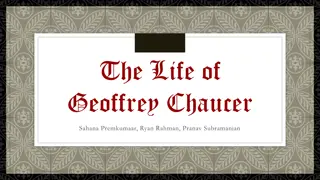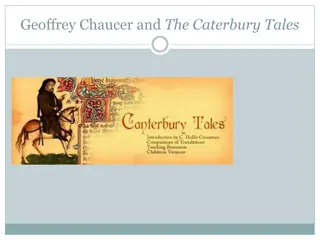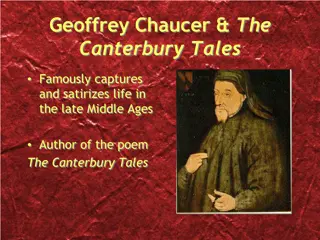Influential Writers: Chaucer and Webster in English Literature
Chaucer, born in mid-14th century London, was influenced by French and Italian poets, creating impactful works like "The Canterbury Tales." On the other hand, Webster, born in 1580, crafted dark revenge tragedies like "The Duchess of Malfi," reflecting the troubled mood of his time. Both writers left a significant mark on English literature with their distinct styles and themes.
Download Presentation

Please find below an Image/Link to download the presentation.
The content on the website is provided AS IS for your information and personal use only. It may not be sold, licensed, or shared on other websites without obtaining consent from the author.If you encounter any issues during the download, it is possible that the publisher has removed the file from their server.
You are allowed to download the files provided on this website for personal or commercial use, subject to the condition that they are used lawfully. All files are the property of their respective owners.
The content on the website is provided AS IS for your information and personal use only. It may not be sold, licensed, or shared on other websites without obtaining consent from the author.
E N D
Presentation Transcript
Contexts and Critics: Malfi-Merchant
Chaucer Born mid 14thC London. Father was a wine-merchant. Died in 1400. Buried in Westminster Abbey. Married into nobility (Philippa de Roet; connection to John of Gaunt) Received royal patronage from both Edward III and Richard II. Travelled across Europe in army and as diplomat. ( The demeanor of the diplomat Ackroyd) Influenced by French Romances ( Roman de la Rose ) and Italian poets Dante, Petrarch and Boccaccio.
The Canterbury Tales: The Merchants Tale in the context of the whole text The Canterbury Tales was unfinished when Chaucer died. It s form and style show the influence of Boccaccio s Decameron . One of the four marriage tales featured in The Canterbury Tales. They run consecutively, which can be seen in the way the pilgrims converse or refer to one another s stories. Each of the stories present a different view on marriage. The Wife of Bath female empowerment ( sovereignty ) The Clerk female subservience The Merchant danger and deceit The Franklin love, loyalty and mutual respect
Webster Born 1580 in Devon. Moved to London to be a lawyer. Died in 1634, six years before the outbreak of the civil war. Webster s two famous revenge tragedies : The White Devil and The Duchess of Malfi. The skull beneath the skin T.S. Eliot. Both performed 1612-1613, by Shakespeare s group The Kings Men , at the Blackfriars (The Tempest). Richard Burbage Shakespeare s greatest tragedian played Ferdinand.
The Duchess on the Jacobean stage As with Shakespeare s late Jacobean tragedies (Macbeth, Hamlet, Othello and King Lear), Webster s plays reflect the dark, troubled mood of James reign. The appetite for bloody and shocking revenge tragedies is revealed by the quantity of them: Thomas Kyd s The Spanish Tragedy ; Thomas Middleton s The Revenger s Tragedy . Webster s plays stand out for putting a strong female at the heart of the action (Vittoria in W.D). Women not the subject of tragedy. In politics, however, Webster had precedents in Elizabeth I and Lady Arbella Stuart (who entered secret, ill-fated marriage). Main source was William Painter s Palace of Pleasures (1567), recounting the real story of Giovanna, Duchess of Amalfi (d.1511) and Antonio di Bologna























